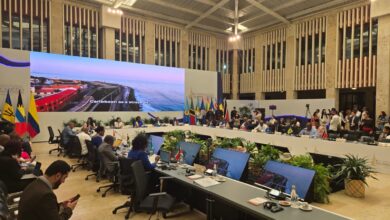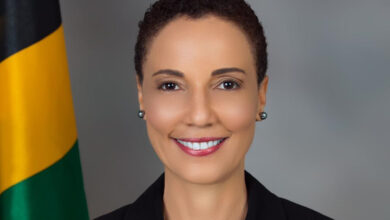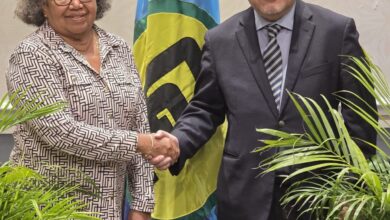(CARICOM Secretariat, Turkeyen, Greater Georgetown, Guyana) More than 300 persons from eleven Caribbean Community (CARICOM) Member States and Associate Members have so far been involved in the response to the devastating earthquake which struck Haiti on 12 January.
The Region’s initial response was spearheaded by Jamaica, the sub-regional focal point with responsibility for the northern geographic zone of the Caribbean Disaster Emergency Management Agency (CDEMA) which includes Haiti among its five countries. CDEMA is the regional response mechanism for natural disasters.
Personnel from Antigua and Barbuda, Barbados, Belize, The Bahamas, Dominica, Guyana, Grenada, Saint Lucia, St. Vincent and the Grenadines and the British Virgin Islands along with Jamaica form the CARICOM Contingent which has been providing support in seven areas after the initial search and rescue, medical, security and engineering teams had been supplied by Jamaica within 48 hours of the earthquake.
CARICOM’s continuing interventions in Haiti include: Emergency Response Coordination; Medical Assistance; Logistics, inclusive of the distribution of relief supplies and engineers assessments; Security; CARICOM Civilian Evacuation and Resource Mobilisation. The Region’s interventions have stretched outside of the capital to locations such as Killick, Leogane, Archaie, Montrouis, lle de la Gonave and Gonaives.
The Emergency Response Coordination was primarily to deliver critical technical support to Haiti while establishing an in-country base camp for a CARICOM-coordinated operation. In the week following the quake, CDEMA had deployed a Tactical Advance Party (TAP) to meet with the Cabinet Minister of the Interior Ministry, Mr. Pierre Andre Paul to discuss Haiti’s immediate needs and to ascertain how CARICOM could assist. Against this backdrop, a Special Coordinator, Brigadier General (Ret) Earl Arthurs of Belize, was appointed to ensure that CARICOM’s response on the ground was effective and to establish a link between CDEMA and Haitian officials as well as international agencies and countries involved in the relief effort.
In an effort to strengthen its Emergency Response Coordination, CDEMA also deployed three experience personnel in Emergency Operations Management and Logistics to support Haiti’s Civil Protection Department. They assisted in the coordination of emergency response actions in support of the national coordination arrangement – one of the priority areas identified by Haiti. Assistance was also rendered to release the immense backlog of relief supplies and food at the airport which were accumulating, but trickling out.
The Management and Logistics team also assisted in preparing a comprehensive plan to facilitate better delivery of items into the hands of those most in need and establish a plan for sheltering the displaced population.
With regard to Search and Rescue, the Jamaica Fire Brigade and the Defence Force assisted in responding to 15 cases with six being rescued. The team has since returned home after the Government of Haiti called off the rescue mission.
A team of 20 health personnel from the Jamaica Ministry of Health as well as from the military are still on the ground providing support to the Centre Sante Bernard Mevs and a Community Hospital in Feres. The Jamaica defence Force medical team established a clinic on 18 January and formulated an action plan for the medical and health management of refuges/displaced persons/illegal immigrants and have provided medical care for more than 1,000 patients, so far.
The CDEMA coordinated Logistics and Engineering Assessments resulted in a CARICOM Regional Logistics Centre being established at the Norman Manley International Airport, Kingston, Jamaica to process the inflow of relief supplies from around the Region. Through this amalgamation of relief supplies, approximately 2,500 boxes of relief supplies have been delivered to Haiti. Arrangements are currently underway for the transport of additional supplies through an air bridge which has been established between Jamaica and Port-au-Prince. The airbridge, via aircraft provided by the Regional Security System, operates two scheduled flights a day.
CDEMA has also deployed a two-man team to boost the capacity of the Office of Disaster Preparedness and Emergency Management (ODPEM) in Jamaica to further support the logistic coordination of relief supplies.
Currently in Haiti, the CARICOM Disaster Relief Unit is manned by a 26-member team which is assisting in the distribution of relief supplies and providing assistance to Food for the Poor organisation in Port-au-Prince in its distribution.
With regard to Engineering Assessments, a technical team comprising senior builders, electricians, and plumbers conducted inspections in five locations across Port-au-Prince. The team’s assessments covered damaged senior citizens’ home, a home for the physically and mentally challenged and the Food-for-Poor-Warehouse.
Since the quake struck, CARICOM facilitated the ongoing evacuation of CARICOM nationals who have made such requests. This facility is critical as it ensures that resources on the ground were directed to the Haitians in need.
The Community has also been engaged in mobilising resources from governments, international donors, the private sector and civil society. These multi-sectoral disaster relief responses have seen overwhelming assistance to the people of Haiti in the form of cash donations, technical resources, medical and humanitarian supplies. CARICOM also responded urgently to an appeal by the Prime Minister of Haiti to lobby the international community for Haiti’s long term recovery and reconstruction. In this stead, the Most Honourable P.J. Patterson, Former Prime Minister of Jamaica led a CARICOM delegation to a meeting of a Coordination Committee created to organise an International Conference which will devise a Strategic Plan for the reconstruction of Haiti.
The Committee held its first meeting on Monday, 25 January in Montreal, Canada. CARICOM Assistant Secretary-General Foreign and Community Relations, Ambassador Colin Granderson, Executive Director of the Caribbean Disaster Emergency Management Agency (CDEMA), Mr Jeremy Collymore and former senior United Nations official with experience in disaster management, Mr. Hugh Cholmondely accompanied Mr. Patterson to that meeting.
As CARICOM continues its intervention in Haiti, emphasis has been placed on ensuring human rights of the people affected by the disaster is respected. There has also been high priority placed on the security of the multifaceted CARICOM disaster response teams and display of professionalism in all relief efforts.





